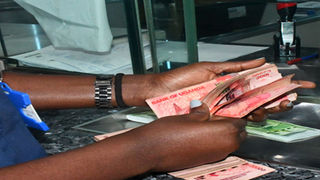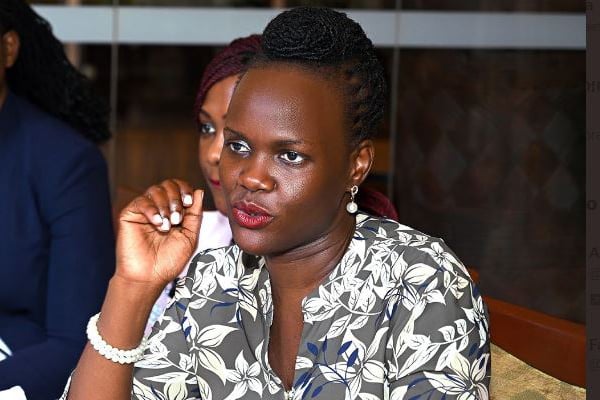
A teller counts money in a banking hall. Uganda Development Bank’s total assets have exponentially grown from Shs200 billion in 2013 to Shs1.4 trillion as at December 2022. PHOTO/ Edgar R. Batte
|What will break the barriers to accessing development finance?
What you need to know:
- Although Uganda Development Bank currently disburses loans in the excess of Shs700 billion annually to various qualifying projects across the country, economists say it is still too small to boost the country’s development.
At the height of World War II and the cold war, Development Finance Institutions (DFIs) were set up to foster development after a lot of loss. In USA, it was the Overseas Private Investment Corporation (OPIC) in 1971 while in Uganda, it was Uganda Development Bank in 1972 by presidential decree. These are government backed and set as countries look for ways to facilitate private sector investment in developing and emerging market economies.
Prof Fred Muhumuza, a development economist, says development finance, which DFIs give is meant to facilitate long-term investments such as buying land, and building a factory.
“That calls for patient capital where shareholders avail money that they do not expect interest but a profit though this would start trickling in, say after four years. However, this does not happen with a commercial bank as it is not that patient but could help you to fund operations such as buying inputs, paying salaries using operational funds,” he says.
At its onset, Uganda Development Bank Limited (UDB) was started to finance technically feasible, economically viable and socially desirable projects.
Ms Patricia Ojangole, the managing director of UDB says initially, the bank realised relative growth, building an investment portfolio of $170 million by 1985.

“The civil unrest in the 1980’s adversely affected the Bank’s business. However, in May 2001, Uganda Development Bank was incorporated becoming Uganda Development Bank Limited (UDBL) for autonomy and the Bank’s turn-round process commenced,” she says.
With a mandate to profitably finance viable economic development projects in Uganda, the bank’s total assets have exponentially grown from Shs200 billion in 2013 to Shs1.4 trillion as at December 2022.
“The bank currently disburses loans in the excess of Shs700 billion annually to various qualifying projects across the country,” Ms Ojangole says.
However, Prof Muhumuza says this portfolio is very small to finance activities that will enable the country’s development.
“The country’s economy is at Shs165 trillion, therefore, the Shs1.4 trillion portfolio is insufficient. Unfortunately, it cannot be increased because it is part of the government’s budget which is already constrained by very many things,” he says.
While there are several banks to lend investors, if they wished, the conversation of lack of development finance is pointed to a lack of patient capital where one has a grace period within which they may either pay nothing or just the interest on the loan and can pay back the premium in say 10 years. By that time, the establishment would have picked up,” he says.
Prof Muhumuza adds that he would not call UDB a DFI because its sources do not give it patient capital yet it is going to sink the capitalisation received into long-term investments.

Professor Fred Muhumuza, a development economist.
“Government, which capitalises UDB borrows from commercial banks at a high interest of say, 17 or 18 percent which is the cost of that capital. Then government instructs UDB to lend at 12 percent and in that way, the borrower from UDB is already subsidised. However, there are also operational costs from UDB. So the real return on that loan may drop to 8 percent. The economy cannot be grown that way,” he says.
Prof Muhumuza says the idea would be that government opens up shares in UDB to other banks who would lend in equity.
“The problem is that government fears that when other shareholders come in, they will take on the bank. That is not true because though Africa Development bank is not African because 80 percent of its funding comes from outside Africa, it benefits African countries,” he says.
The other option would be for government to get foreigners to join in, which is how direct foreign investment comes in, because the economy is financially constrained. However, he points out that these are looking at return on investment.
As such, Uganda should have something unique it offers above its neighbours to attract these investors.
“Unfortunately, the political atmosphere alone is seemingly uncertain. Therefore, alternatives such as Tanzania pop up because it has a predictably stable political environment. The comfort the investors have is that they are still in East Africa and will not incur taxes to sell in Uganda. This uncertainty greatly affects us as we cannot easily attract DFI for a long term nature,” he says.
The current issue that could push away long term DFI is the dismantling of the energy sector as Prof Muhumuza says that many foreigners were starting to invest in the country with the comfort that Uganda is now accommodative of private capital.
“However, with the Umeme concession case where renewal is not an option, investors are uncertain if they will be able to get back their investment should they come in. As such, most are resorting to investing in trade because it is short term and one can diversify with minimal losses,” he says.
He adds that while the country is generating the energy, those who would use it are not getting the green light that Uganda is worth the investment.
“Energy costs continue increasing to cater for production and transmission costs which further pushes investment away. With such scenarios, we cannot get patient capital in Uganda,” Prof Muhumuza says.
Apart from UDB and the country failing to attract better sources of capital, Prof Augustus Nuwagaba, a renowned economist, says Ugandans also have several gaps that ought to look into:
Poor saving culture
Ugandans have a very poor saving culture with a saving to GDP ratio of less than eight, which is less than African standards of 20.
“Oftentimes, by the time 99.9 percent of the 45m Ugandans receive their salaries, they are simply paying debts. This is not because we earn little because even one earning Shs500,000 can save more than one earning Shs10m. It is an issue of the culture and priorities,” he says.
He adds that without saving, investment is difficult as it is better to use equity, lest one borrows though they become heavily indebted.
“You cannot build a shopping mall using a commercial bank loan because it is a short term money source yet a mall is a long-term investment that should get its financing from a long term financing source. No wonder, many are on sale,” he says.
Failure to identify investment
Prof Nuwagaba says it is baffling for a Ugandan to invest in building apartments yet there is no certainty of where to get long-term financing. Ultimately, the Internal Rate of Return (IRR) will be lower than the capital, which then affects the return on capital and the net present value (the amount of money you are getting from that apartment relative to its value at a certain time in future).
“For instance, if you are spending $2m to build the apartment, the value of $2m could have depreciated to $500,000 in say five years. Therefore, you needed to have hedged this money to help maintain its value. That is where hedge funds come in yet they are not in commercial banks. That is why it is important to work with financial advisors yet many shy away,” he says.
Prof Nuwagaba says, now, the ideal investment is treasury bills and bonds because the interest rate is at 18 percent where Shs1b is Shs15m per month and the risk is zero.
In regards to clients dealing with UDB, Prof Muhumuza says the UDB he knew then is reflected in the story of Brovad hotel in Masaka where despite the death of the sole owner, the bank was proactive to get back its money but also empower the surviving family.
“The hotel owner had borrowed from the bank to build the hotel but passed away in a car accident, leaving it to wives that had not been part of its running. The bank, in order to recover its money and leave the surviving owners with a means of living, appointed a manager who was UDB staff that trained the household owners on how to run the business, ably pay back the loan, while having food at home. They handheld them for two years when the loan was paid and they handed the hotel back to them. I do not see the current UDB doing the same,” he says.
Prof Muhumuza adds that the UDB then did not expect the informal sector to run around for the requirements to get the loan but employed a manager to help them and the services charged on the loan.
As a government entity, UDB is also marred with bureaucracy, which makes access to funding somewhat tougher thus many miss the opportunities, prompting the search for funding.
“I met someone who owns a hotel worth, approximately Shs8 b and needed a loan of Shs2.2 b but UDB assessed the hotel and committed to giving him Shs700m.
Sometimes, the bank staff do not connect the dots where the land was inherited hence there is no title in his name but there is an agreement with the family that he can use the land and there is no qualm about it.
However, the officials ask for a land title in his name or that of the business whose processing may take a year or so, yet they could have worked with the community to first ask about ownership. With that settled, the loan would be given as the formalisation process continues, he says.
Prof Muhumuza says many investors go to commercial banks for faster transactions.

A man spreads out coffee beans in Western Uganda. At its onset, Uganda Development Bank Limited was to finance technically feasible, economically viable and socially desirable projects. PHOTO/ File
Prof Muhumuza says these complications can only be changed if a good board is in place to set more proactive policies.
Government should scale back on its shareholder ownership to allow other players to buy in. However, these cannot put their money if they have no say in the operations of the bank hence asking for positions on the board.
“With a myriad of expertise as well as a bigger fund pool, they not only tweak the bank’s governance because they need the money to grow but also have a better position to see opportunity in times of funding scarcity. Uganda needs a development bank that looks at business that way and it can only be possible when the shareholders have deep pockets hence affording to incur losses for three years,” he says.





